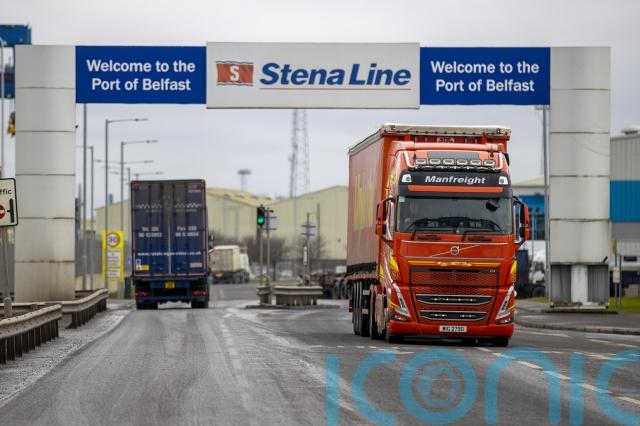
Northern Ireland’s post-Brexit trade arrangements are something you “wouldn’t make up unless you had to”, a peer who led a review of their operation has told MLAs.
Lord Paul Murphy also said some small businesses in Britain simply “don’t bother” trading with Northern Ireland anymore because of the burden of bureaucracy created by the Windsor Framework.
The former Northern Ireland secretary also said that people “didn’t think enough” about the consequences for the region when they voted for Brexit.
The Windsor Framework, which replaced the Northern Ireland Protocol, is the joint EU/UK accord that sets out post-Brexit rules for the region.
To ensure no hardening of the Irish land border after the UK’s withdrawal from the European Union, Northern Ireland continues to follow many EU trade and customs rules.
The framework requires checks and customs paperwork on goods moving from Great Britain into the region.
It also includes a series of measures designed to address concerns that politicians and businesses in Northern Ireland have a limited role in influencing the post-Brexit rules that apply in the region.
This included the establishment of a dedicated committee at the Assembly to scrutinise EU law changes proposed to come into effect in Northern Ireland and a mechanism called the Stormont Brake which allows a minimum of 30 Stormont MLAs, from at least two parties, to refer a proposed EU law change to the UK Government.
Lord Murphy was commissioned by the Government to carry out a review of the arrangements and delivered a number of recommendations earlier this year.
During an appearance before Stormont’s Economy Committee, the peer said there was no doubt an issue remained over the “democratic deficit” in Northern Ireland created by the framework rules.
He said: “The decision to leave the European Union, whatever your views for or against, meant that people didn’t actually think enough about Northern Ireland, certainly in Britain they didn’t, and what had to be put in place were we to leave the EU hadn’t been thought about enough.
“So, we ended up with the (Northern Ireland) Protocol, that didn’t work and then this (Windsor Framework) came along as an improvement.
“Generally speaking, most people I spoke to saw it as an improvement on the protocol.
“But it is still something you wouldn’t make up unless you had to, it’s almost a plaster to make things work here in a highly complicated situation.”

Lord Murphy said Stormont’s Windsor Framework Democratic Scrutiny Committee, which was created to scrutinise EU law changes, is under “severe pressure”.
He added: “There is masses of material coming to it, too little time to scrutinise it, insufficient, inadequate resources attached to the advice given to it, not sufficient good relations between Northern Ireland and Whitehall.”
Lord Murphy also said there were issues of trust in the unionist community around the workings of the Stormont Brake.
Turning to the impact of the arrangements on businesses, Lord Murphy said large companies were able to make use of access to dual markets more effectively.
But he added: “But with medium and small businesses, which form the backbone of Northern Ireland, it was a different picture altogether.
“The big thing that struck me was the burdens of bureaucracy that were on smaller businesses, they couldn’t cope with them really.
“British businesses, by which I mean businesses which are based in Great Britain wanting to trade with Northern Ireland, in the end they found it, are finding it very burdensome and to a large extent don’t bother because they can’t cope with it any more.”
He said there needed to be a “one-stop shop” for companies wanting information on how to trade between Northern Ireland and the rest of the UK.
He told MLAs: “I remember one business in Ballymena. She had set up a new business, been a teacher, set up a new business and was in tears with me about the fact that she couldn’t find out the answers to questions on all these things.
“A lot of money has been spent by government, either here or in Whitehall on all the different schemes that exist, it seems to me they are not actually working as well as they could do.
“There really has to be a streamlining of advice so that people can go to a single point for advice on where they go.”
The peer then told the committee that an essential part of the creation of the Good Friday Agreement in 1998 had been the principle of parity of esteem.
He said: “Equal weight is given to everybody in terms of their views on the constitutional position.
“I am not totally convinced that has been the case over the past number of years.
“Whatever changes to the constitutional status regarding the Windsor Framework has to be done in the context of people getting together and sorting it out.
“The only way things can change in Northern Ireland is by agreement between everyone and that applies as much to the Windsor Framework as it does to anything else.”
Subscribe or register today to discover more from DonegalLive.ie
Buy the e-paper of the Donegal Democrat, Donegal People's Press, Donegal Post and Inish Times here for instant access to Donegal's premier news titles.
Keep up with the latest news from Donegal with our daily newsletter featuring the most important stories of the day delivered to your inbox every evening at 5pm.